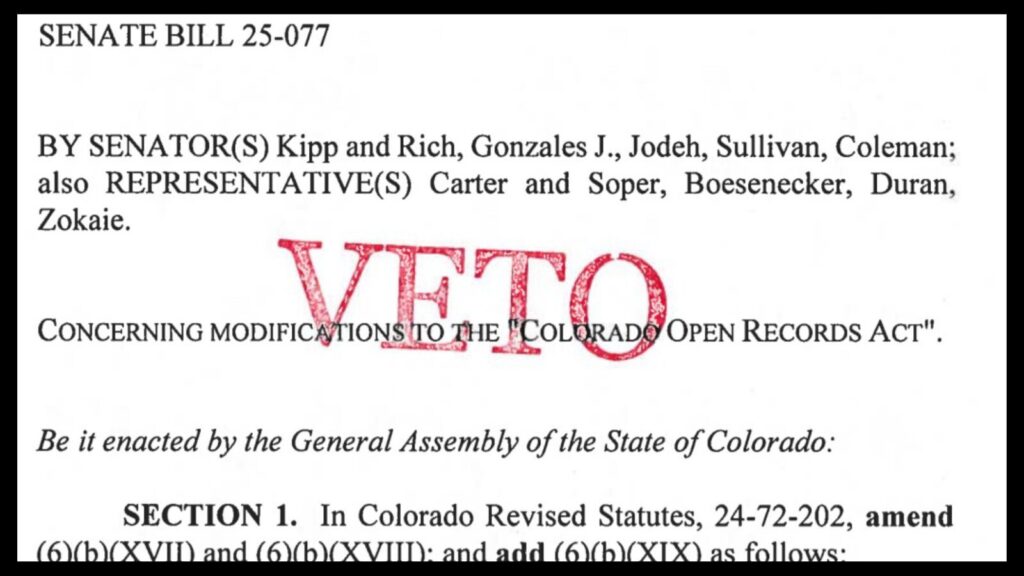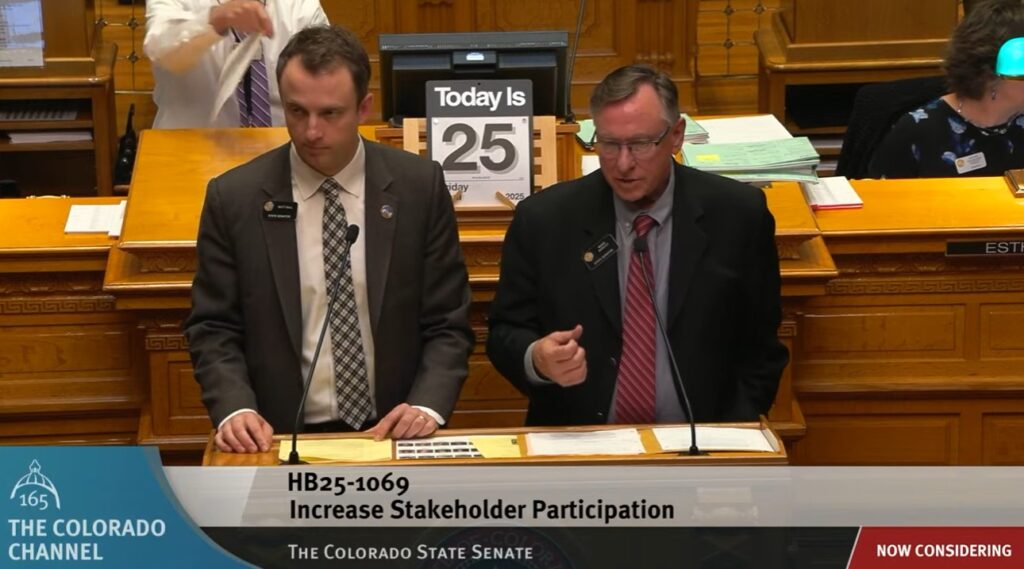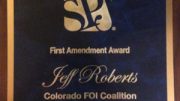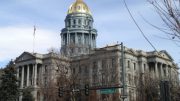Update: Gov. Jared Polis vetoed House Bill 25-1147 on Friday, May 16.
By Jeffrey A. Roberts
CFOIC Executive Director
Lawmakers made another unsuccessful attempt to weaken the Colorado Open Records Act during the 2025 state legislative session, which ended Wednesday.
For the second consecutive year, a bipartisan group of legislators pushed a bill to give governments more time to respond to CORA requests made by the public and businesses. Although both chambers of the General Assembly passed Senate Bill 25-077 by wide margins, Gov. Jared Polis vetoed it on April 17, writing that he supports “more, not less, openness and transparency.”
On other transparency and freedom-of-information issues, the legislature this session added significant CORA exemptions for public universities and Colorado Parks and Wildlife. It also deflected an attempt to repeal the extensive Colorado Open Meetings Law exemptions legislators gave themselves in 2024, and it killed a bill to create an online clearinghouse of pre-introduced legislative proposals in between sessions.
On the positive side, the General Assembly reinforced a 2023 law that requires the livestreaming of criminal court proceedings and took steps to safeguard public school libraries from book banning attempts. Legislators also enhanced the transparency of metropolitan districts and the Public Employees’ Retirement Association (PERA) board. And some legislative leaders expressed support for video livestreaming legislative committee meetings, which would bring Colorado in line with the 49 other states and the District of Columbia.

The sponsors of SB 25-077, the CORA bill, said it was needed because “the volume and complexity of records requests have grown dramatically.”
The Colorado Freedom of Information Coalition had asked the governor to veto the bill, would have given records custodians five working days, rather than three, to fulfill CORA requests made by the public and an additional 10 working days, rather than seven, if “extenuating circumstances” exist. “By extending CORA response times to three weeks if governments claim that ‘extenuating circumstances’ apply — which happens frequently — SB 25-077 essentially gives records custodians an excuse to further delay providing public records within a reasonable period of time,” CFOIC’s letter to Polis said. We also argued against imposing additional barriers to obtaining public records when requesters already face high fees in many instances.
The governor was particularly troubled by provisions in the bill that exempted journalists (as defined by the state’s press shield law) from the extended response deadlines and let records custodians take up to 30 working days to fulfill requests made “for the direct solicitation of business for pecuniary gain” and charge a “reasonable cost” — rather than the maximum hourly rate in CORA — to do so.
“Essentially, under this bill, speed to access public information is determined by who you are,” Polis wrote. Government employees, he added, should not be put “in the perilous position of determining whether a requester is a legitimate ‘mass medium’ or ‘newsperson’ (e.g. a member of the media) or whether they are making a request for pecuniary — or financial — gain. The bill leaves the custodian with far too much power to define who is and is not a member of the media, and what is and isn’t news.”
The sponsors of SB 25-077 eventually abandoned an effort to override Polis’ veto.
Another measure, House Bill 25-1242, presented legislators with an opportunity to address numerous problems with Colorado’s open-government laws (from CFOIC’s perspective), but the Republican-sponsored proposal died in the House State, Civic, Military & Veterans Affairs Committee, which is dominated by Democrats. Among other provisions, the wide-ranging bill would have significantly lowered the cost of obtaining public records under CORA and clarified that the statute’s personnel files exemption does not apply to records about “the exercise of official government functions by any public employee.”
It also would have repealed last year’s Senate Bill 24-157, which narrowed the definition of “public business” as it applies to the legislature and let state lawmakers communicate by email and text message without having to worry about violating the open meetings law. Majority Democrats in both chambers used the new definition of public business to exclude reporters from caucus meetings before a special session on property taxes last August.
Here is a roundup of other 2025 government transparency, freedom-of-information, First Amendment and press-related measures tracked by CFOIC:
Damage by wildlife. Proponents of Senate Bill 25-038, which Polis signed into law in March, said it is needed to protect ranchers from harassment when gray wolves kill their livestock, although the bill grants confidentiality to all claimants under Colorado’s wildlife damage compensation program. The name and other personal information of someone who files a claim with Colorado Parks and Wildlife is not subject to disclosure under CORA unless a claimant “takes actions or makes statements that lead to the person’s personal information becoming publicly known.”
NIL contracts. Polis also signed House Bill 25-1041, which makes name, image and likeness contracts between public universities and student athletes confidential. But in doing so, he noted an “unfortunate trend of legislative proposals that ultimately impede access to official records.”
In committee testimony CFOIC board member Eric Maxfield said that “concealing NIL records from the public disserves the interests of every stakeholder — the public, the athletes and college sports itself — in making sure that competition is fair, honest and passes the test of legitimacy, and that athletes have equitable earning opportunities befitting their level of accomplishment.”

Pre-introduced bills. Representatives passed House Bill 25-1069 with only one vote in opposition. But then senators narrowly killed the measure, which would have created an online clearinghouse where state lawmakers could voluntarily post drafts or titles of bills in between sessions of the General Assembly.
Criminal courts livestreaming. Most of House Bill 25-1147, sent to Polis in late April, concerns municipal court sentencing practices. But it also makes clear that provisions in a 2023 law requiring the livestreaming of criminal court proceedings “supersede” previous statutes, judicial guidance or chief justice directives, “including Chief Justice Directive 23-02.” The bill prohibits courts from adopting blanket rules for limiting the remote observation of proceedings, and it says exceptions must be “case specific and fact specific.”
Legislative committee livestreaming. CFOIC research found that Colorado’s legislature is the only one that does not provide at least some video coverage of committee meetings, rather than an audio-only stream. House Speaker Julie McCluskie, D-Dillon, endorsed a $70,000 Legislative Council proposal to upgrade the current Sliq MediaTechnologies system by enabling cameras already installed in each state Capitol committee room. In late April, McCluskie and other legislative leaders discussed — but did not vote on — a possible pilot program.
Metro district transparency. House Bill 25-1219, sent to Polis in late April, requires most metropolitan districts to post online “in plain, nontechnical language” information about their debt, mill levies and how residents can serve on their boards.
PERA board transparency. Sent to the governor May 2, Senate Bill 25-147 requires the PERA board to conduct its meetings in compliance with the open meetings law. It must also regularly update the PERA website with information about meeting agendas, board documents and how the public can participate in meetings. Starting Jan. 1, 2026, the board must also post current financial information, including annual compensation amounts paid to each association employee.
School library protections. Senate Bill 25-063, signed by Polis on May 1, requires public school boards to have policies for acquiring, retaining and displaying books and other school library resources and for removing those resources from circulation. Only parents of enrolled students at a school can request the removal of material from the library, and any request to remove materials is an open record under CORA.
Railroad reports. Senate Bill 25-052, signed by Polis in March, repeals a requirement that Public Utilities Commission investigative reports on railroads be kept confidential but gives the PUC the authority to make reports on ongoing investigations and railroad security confidential. Those rules “must not make final reports of investigations confidential and must require the timely release of information if public knowledge of the information would protect the public safety, health, or welfare.”
POST database. House Bill 25-1136, which passed on May 1, updates what information must be included in a searchable online database maintained by the Peace Officers Standards and Training (POST) board. The bill gives the POST board the authority to correct errors in the database, and it lets peace officers appeal their inclusion in the database.
Whistleblower protections. House Bill 25-1031, sent to Polis on May 2, lets law enforcement officers sue their employers if they face retaliation for reporting alleged misconduct or safety violations by other officers.
Follow the Colorado Freedom of Information Coalition on X or BlueSky. Like CFOIC’s Facebook page. Do you appreciate the information and resources provided by CFOIC? Please consider making a tax-deductible donation.




